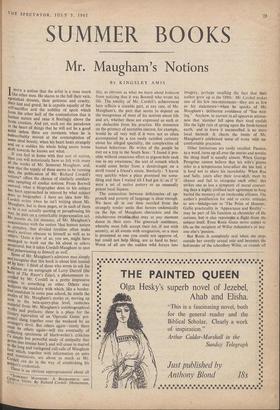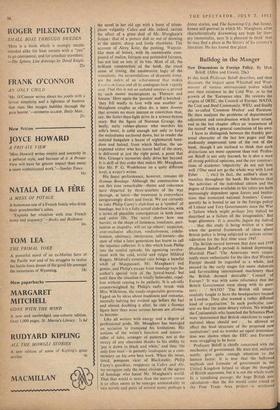SUMMER BOOKS
Mr. Maugham's Notions
BY KINGSLEY AMIS IHAVE a notion that the artist is a man much like other men. He shares to the full their vain, egotistical dreams, their pettiness and cruelty, their lust and greed; he is capable equally of the self-sacrifice and the nobility of spirit which
form the other half of the contradiction that is human nature and raise it fleetingly above the brute creation. And yet, such are the paradoxes at the heart of things that he will not be a good artist unless there are moments when he is indescribably moved at the contemplation of some ideal beauty, when his heart beats strangely and on a sudden his whole being seems borne aloft towards he knows not what. .
You feel at home with that sort ot notion, then you will notoriously have so felt with many of the works of Mr. Somerset Maugham, and, now that the supply of these seems to be running thin, the publication of Mr. Richard Cordell's volume* offers the chance of similarly comfort- able sampling of similar notions. From Boswell onward, what a biographer does to his subject has been approached in interest by what subject does to biographer. I have no idea how Mr. Cordell writes when he isn't writing about Mr. Maugham. but in these pages, or in such of them as he is not actually quoting or paraphrasing his Way, he puts on a remarkable impersonation act. He assures us. for instance, of Mr. Maugham's acquaintance with the notion 'that human nature IS complex, that divided loyalties often make man's motives obscure to himself as well as to others.' Quite a few of us, you see, might have managed to work out the bit about to others unassisted, but it takes Cordell-Maugham to spot that prizewinning to himself as well. Some of Mr. Maugham's admirers may simply not recognise that this book is about him instead of by him: I think of those who wrote to ask for a picture or an autograph of Larry Darrell (the hero of The Razor's Edge), a phenomenon re- corded by Mr. Cordell as a pretty impressive tribute to something or other. Others may W_.elcome the assiduity with which, like a border- line candidate in some pass school, he retells the stories of Mr. Maugham's stories or, moving up now to the beta-query-plus level, restitches Material from Mr. Maugham's autobiographical NIYorks and prefaces; there is a place for the IterarY equivalent of an 'Operatic Gems' pot- pourri slung together over the weekend by an arranger's devil. But others again—surely there must he others again—will tire eventually of collecting specimens of blurb-writer's criticism ea simple but powerful study of antipathy that grows into intense hate'), and will cease to marvel
the long and variegated roll-calls of Maugham faans Which, together with information on sales _.nd translations, are about as much as Mr. Cordell can do in the way of establishing his subject's credentials. There is an obvious appropriateness about all
crt*nlocAmLEasET MAUGHAM : A BIOGRAPHICAL AND 25s.) STuoy. By Richard Cordell. (Heinemann, this, as obvious as what we learn about Johnson from noticing that it was Boswell who wrote his life. The totality of Mr. Cordell's achievement here reflects a sizeable part, at any rate, of Mr. Maugham's, the part that seems to depend on the meagreness of most of his notions about life and art, whether these are expressed as such or are deducible from his practice. His insistence on the primacy of narrative interest, for example, would be all very well if it were not so often accompanied by a too easily satisfied curiosity about his alleged speciality, the complexities of human behaviour. He writes of the people he met on a trip to the South Seas : 'I found it pos- sible without conscious effort to pigeon-hole each one in my awareness,' the sort of remark which would come better from a dendrologist on a stroll round a friend's estate. Similarly: 'I learnt very quickly when a place promised me some- thing and then I waited till I had got it,' as if 'it' were a set of native pottery or an unusually potent local liqueur.
The connection between deficiencies of ap- proach and poverty of language is clear enough. We have all in our time recoiled from the strangely tender smile that hovers endemically on the lips of Maugham characters and the mischievous twinkle that may at any moment dance in their eyes. The gimcrack antitheses, whereby most folk accept their lot, if not with serenity, at all events with resignation, or a man is presented as one you could not approve of, but could not help liking, are as hard to bear. Worst of all are the sudden wild forays into
imagery, perhaps recalling the fact that their author grew up in the 1890s: Mr. Cordell makes one of his few mis-statements--they are as few as his statements—when he speaks of Mr. Maugham's *deliberate avoidance of "fine writ- ing." Anyhow, to narrate in all apparent serious- ness that 'slumber fell upon their tired eyelids like the light rain of spring upon the fresh-turned earth,' and to leave it uncancelled, is no mere local blemish It charts the limits of Mr. Maugham's celebrated sense of irony with un- comfortable precision.
Other limitations are easily recalled. Passion, as a word, turns up all over the stories and novels; the thing itself is usually absent. When George Peregrine cannot believe that his wife's poems refer to a tempestuous love-affair she has had, it is hard not to share his incredulity. When Red and Sally, years after their love-idyll, meet by chance and fail to recognise each other, this strikes one as less a symptom of moral coarsen. ing than a highly civilised tacit agreement to keep buried the memory of an intolerable silliness. The author's predilection for odd or exotic attitudes to sex—hidalgo-ism in 'The Point of Honour,' Gallic practicality in 'Appearance and Reality'— may be part of his function as chronicler of the curious, but it also represents a flight from the. subject itself. Even Rosie Gann never comes to life as the recipient of Willie Ashendcn's or any one else's 'passion.
But Rosie is completely real when she steps outside her overtly sexual role and becomes the befriender of the schoolboy Willie, or rounds oil
the novel in her old age with a burst of trium- phant vulgarity. Cakes and Ale, indeed, carries the effect of a great deal of Mr. Maugham's fiction : that of a picture dull or out of drawing at the centre, sharp and lively elsewhere. The account of Alroy Kear, the pushing, Walpole- like man of letters, with its inextricable com- pound of malice, fairness and pretended fairness, has not lost an iota of its bite. Most of all, the brilliant construction of the book, the exact sense of timing, the unobtrusive logic of the transitions, the accumulations of dramatic irony, are the index of an achievement that makes Evriess in Gaza and all its analogues look vaguely arid that this is not an isolated success is proved by such minor masterpieces, as `Flotsam and Jetsam.' Here again the `passion' stuff is botched: 'they fell madly in love with one another as Maugham couples so often do, a mere dorm& that arouses no more interest or conviction than, say, the faster-than-light drive in a science-fiction story. But the figure of Norman Grange, the beefy, surly rubber-planter who murders his wife's lover, is solid enough not only to keep the melodrama anchored down, but to render the isolated bungalow a haunt of nightmarish bore- dom and hatred, from which Skelton, the un- expected visitor who has learnt half of the story, is delivered at just the right point, a point that Mrs. Grange's memories daily drive her beyond. It is skill of this order that makes Mr. Maugham, like Mr. P. G. Wodehouse on a quite different level, a writer's writer.
His finest performance, however, remains Of Human Bondage. Although the construction is not this time remarkable—theme and coherence have departed by three-quarters of the way through, at latest—the treatment is everywhere invigoratingly direct and literal. We are certainly to take Philip Carey's club-foot as a `symbol' of bondage, but it is a fully actual club-foot too, with a series of plausible consequences in both inner and outer life. The novel shows how one barrier, in the shape of lameness, loneliness, puri- tanism or stupidity, will set up others: suspicion, over-exclusive affection, vindictiveness, exhibi- tionism, obstinacy, intolerance, self-torture—the state of what a later generation has learnt to caU the injustice collector. It is this which leads Philip into the central episode, his agonising involve- ment with the cold, trivial and vulgar Mildred Rogers. Mildred's eventual ruin brings a baneful whiff of Maupassant, Mr. Maugham's evil genius, and Philip's escape from bondage taps the author's special vein of the lyrical-banal, but until then the situation is totally believable, repel- lent without ceasing to be pathetic. It is adroitly counterweighted by Philip's early brush with Miss Wilkinson, the randy-respectable governess. Egged on by ideas about manliness and romance, mentally halving her evident age before the fact and almost doubling it after, he cuts a 'funnier figure here than most serious heroes are allowed to become.
Like all writers with energy and a degree of professional pride, Mr. Maugham has managed on occasion to transcend his limitations. His notions of the writer's function and nature— teller of tales, arranger of patterns, hot at the mercy of any obsession thanks to his ability to `put it down in, black and white,' and thus 'the only free man'—is patently inadequate as a com- mentary on his own best work. When the mean, timid, pompous vicar of •Blackstable, Philip Carey's guardian, reappears in Cakes and Ale, we recognise only the Most obvious of the agents of bondage who haunt Mr. Maugham's world. That that world is more than the narrow corner it so often seems to be emerges unmistakably in two novels and parts of several more, perhaps a dozen stories, and The Summing-Up, that funny, honest self-portrait in which Mr. Maugham, after characteristically disavowing any hope for liter- ary immortality, says 'it is pleasant to think' that he may find a place in the history of his country's literature. He has found that place.



























































 Previous page
Previous page